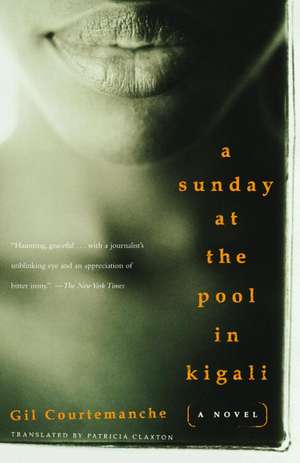A Sunday at the Pool in Kigali
Autor Gil Courtemanche Traducere de Patricia Claxtonen Limba Engleză Paperback – 30 sep 2004
Vezi toate premiile Carte premiată
All manner of Kigali residents pass their time by the pool of the Mille-Collines hotel: aid workers, Rwandan bourgeoisie, expatriates, UN peacekeepers, prostitutes. Keeping a watchful eye is Bernard Valcourt, a jaded foreign journalist, but his closest attention is devoted to Gentille, a hotel waitress with the slender, elegant build of a Tutsi. As they slip into an intense, improbable affair, the delicately balanced world around them–already devastated by AIDS–erupts in a Hutu-led genocide against the Tutsi people. Valcourt’s efforts to spirit Gentille to safety end in their separation. It will be months before he learns of his lover’s shocking fate.
| Toate formatele și edițiile | Preț | Express |
|---|---|---|
| Paperback (2) | 63.39 lei 3-5 săpt. | +8.69 lei 10-14 zile |
| Canongate Books – 3 mai 2018 | 63.39 lei 3-5 săpt. | +8.69 lei 10-14 zile |
| Vintage Publishing – 30 sep 2004 | 90.23 lei 3-5 săpt. |
Preț: 90.23 lei
Nou
Puncte Express: 135
Preț estimativ în valută:
17.27€ • 18.07$ • 14.29£
17.27€ • 18.07$ • 14.29£
Carte disponibilă
Livrare economică 15-29 martie
Preluare comenzi: 021 569.72.76
Specificații
ISBN-13: 9781400034345
ISBN-10: 1400034345
Pagini: 272
Dimensiuni: 133 x 204 x 15 mm
Greutate: 0.2 kg
Editura: Vintage Publishing
Locul publicării:New York, NY
ISBN-10: 1400034345
Pagini: 272
Dimensiuni: 133 x 204 x 15 mm
Greutate: 0.2 kg
Editura: Vintage Publishing
Locul publicării:New York, NY
Notă biografică
Gil Courtemanche is an author and journalist in international and Third World politics. Among his recent nonfiction works are Québec (1998) and Nouvelles douces colères (1999). He lives in Montreal.
Patricia Claxton is one of Canada’s foremost translators, and the recipient of two Governer General’s Awards for translation. She lives in Montreal.
Patricia Claxton is one of Canada’s foremost translators, and the recipient of two Governer General’s Awards for translation. She lives in Montreal.
Extras
Chapter One
In the middle of Kigali there is a swimming pool surrounded by deckchairs and a score of tables all made of white plastic. And forming a huge L overhanging this patch of blue stands the Hôtel des Mille-Collines, with its habitual clientele of international experts and aid workers, middle-class Rwandans, screwed-up or melancholy expatriates of various origins, and prostitutes. All around the pool and hotel in lascivious disorder lies the part of the city that matters, that makes the decisions, that steals, kills, and lives very nicely, thank you. The French Cultural Centre, the UNICEF offices, the Ministry of Information, the embassies, the president’s palace (recognizable by the tanks on guard), the crafts shops popular with departing visitors where one can unload surplus black market currency, the radio station, the World Bank offices, the archbishop’s palace. Encircling this artificial paradise are the obligatory symbols of decolonization: Constitution Square, Development Avenue, Boulevard of the Republic, Justice Avenue, and an ugly, modern cathedral. Farther down, almost in the underbelly of the city, stands the red brick mass of the Church of the Holy Family, disgorging the poor in their Sunday best into crooked mud lanes bordered by houses made of the same clay. Small red houses -- just far enough away from the swimming pool not to offend the nostrils of the important -- filled with shouting, happy children, with men and women dying of AIDS and malaria, thousands of small households that know nothing of the pool around which others plan their lives and, more importantly, their predictable deaths.
Jackdaws as big as eagles and as numerous as house sparrows caw all around the hotel gardens. They circle in the sky, waiting, like the humans they’re observing, for the cocktail hour. Now is when the beers arrive, while the ravens are alighting on the tall eucalyptus trees around the pool. When the ravens have settled, the buzzards appear and take possession of the topmost branches. Woe betide the lowly jackdaw that fails to respect the hierarchy. Birds behave like humans here.
Precisely as the buzzards are establishing their positions around the pool, precisely then, the French paratroopers on the plastic deckchairs begin putting on Rambo airs. They sniff all the feminine flesh splashing around in the heavily chlorinated water of the pool. Its freshness matters little. There is vulture in these soldiers with their shaven heads, watching and waiting beside a pool that is the centrepiece of a meat stall where the reddest, most lovingly garnished morsels are displayed alongside the flabby and scrawny feminine fare whose only diversion is this waterhole. On Sundays, as on every other day of the week at around five o’clock, a number of carcasses -- some plump, some skeletal -- disturb the surface of the pool, well aware that the “paras,” as the paratroopers are known, are not the least daunted either by cellulite or by skin clinging to bones merely from habit. The women, if they knew what danger stalked them, would drown in anticipation of ecstasy or else get themselves to a nunnery.
This tranquil Sunday, a former minister of justice is warming up energetically on the diving board. He does not realize that his strenuous exercises are eliciting giggles from the two prostitutes from whom he is expecting a sign of recognition or interest before diving into the water. He wants to beguile because he doesn’t want to pay. He hits the water like a disjointed clown. The girls laugh. The paras too.
Around the pool, Québécois and Belgian aid workers vie in loud laughter. The Belgians and Québécois aren’t friends; they don’t work together, even though they are working toward the same goal: ‘development.’ That magic word which dresses up the best and most irrelevant of intentions. The two groups are rivals, always explaining to the locals why their kind of development is better than the others’. The only thing they have in common is the din they make. There ought to be a word for the atmosphere surrounding these Whites who talk, laugh and drink in a way that makes the whole pool know their importance -- no, not even that -- just their vacuous existence. Let’s use the word ‘noisiness’ because there’s certainly noise, but it’s continuous, there’s a permanence to it, a perpetual squawking. In this shy, reticent and often deceptive country, they live in a state of noisiness, like noisy animals. They are also in continuous rut. Noise is their breathing, silence their death, and the asses of Rwandan women their territory of exploration. They are noisy explorers of Third World asses. Only the Germans, when they descend on the hotel in force like a battalion of moralizing accountants, can match the Belgians and Québécois in noisiness.
Important Frenchmen don’t stay at this hotel. They dig themselves in at the Méridien with high-class Rwandans and clean hookers who sip whisky. The hookers at this hotel are rarely clean. They drink Pepsi while waiting to be picked up and offered a local beer, which may get them offered a whisky or a vodka later on. But these women are realists, so today they’ll settle for a Pepsi and a john.
Valcourt, who is also Québécois but has almost forgotten it over the years, observes these things and notes them down, muttering as he does so, sometimes angrily, sometimes with tenderness, but always audibly. For all anyone knows or imagines, he’s writing about them, and everyone wants someone to ask him what he’s writing, and worries about this book he’s been writing since the Project left him more or less high and dry. Sometimes he even pretends to be writing, in order to show he’s alive, watchful and serious like the disillusioned philosopher he claims to be when he runs out of excuses for himself. He’s not writing a book. He writes to put in time between mouthfuls of beer, or to signal that he doesn’t want to be disturbed. Rather like a buzzard on a branch, in fact, Valcourt is waiting for a scrap of life to excite him and make him unfold his wings.
At the end of the terrace, walking slowly and grandly, appears a Rwandan just back from Paris. You can tell, because his sporty outfit is so new its yellows and greens are blinding, even for sunglass-protected eyes. There’s sniggering at a table of expatriates. Admiration at several tables of locals. The Rwandan just back from Paris is afloat on a magic carpet. From the handle of his crocodile attaché case dangle First Class and Hermès labels. In his pocket, along with other prestige labels, he probably has an import licence for some product of secondary necessity, which he will sell at a premium price.
He orders a “verbena-mint” at such volume that three ravens depart the nearest tree. Gentille, who has just completed her social service studies and is interning at the hotel, doesn’t know what a verbena-mint is. Intimidated, she whispers -- so softly she can’t even hear herself -- that there are only two brands of beer, Primus and Mutzig. The Rwandan on his magic carpet is not listening and replies that of course he wants the best, even if it’s more expensive. So Gentille will bring him a Mutzig, which for some is the best and for everyone more expensive. Valcourt scribbles feverishly. He describes the scene with indignation, adding some notes about the outrageousness of African corruption, but he does not stir.
From the Hardcover edition.
In the middle of Kigali there is a swimming pool surrounded by deckchairs and a score of tables all made of white plastic. And forming a huge L overhanging this patch of blue stands the Hôtel des Mille-Collines, with its habitual clientele of international experts and aid workers, middle-class Rwandans, screwed-up or melancholy expatriates of various origins, and prostitutes. All around the pool and hotel in lascivious disorder lies the part of the city that matters, that makes the decisions, that steals, kills, and lives very nicely, thank you. The French Cultural Centre, the UNICEF offices, the Ministry of Information, the embassies, the president’s palace (recognizable by the tanks on guard), the crafts shops popular with departing visitors where one can unload surplus black market currency, the radio station, the World Bank offices, the archbishop’s palace. Encircling this artificial paradise are the obligatory symbols of decolonization: Constitution Square, Development Avenue, Boulevard of the Republic, Justice Avenue, and an ugly, modern cathedral. Farther down, almost in the underbelly of the city, stands the red brick mass of the Church of the Holy Family, disgorging the poor in their Sunday best into crooked mud lanes bordered by houses made of the same clay. Small red houses -- just far enough away from the swimming pool not to offend the nostrils of the important -- filled with shouting, happy children, with men and women dying of AIDS and malaria, thousands of small households that know nothing of the pool around which others plan their lives and, more importantly, their predictable deaths.
Jackdaws as big as eagles and as numerous as house sparrows caw all around the hotel gardens. They circle in the sky, waiting, like the humans they’re observing, for the cocktail hour. Now is when the beers arrive, while the ravens are alighting on the tall eucalyptus trees around the pool. When the ravens have settled, the buzzards appear and take possession of the topmost branches. Woe betide the lowly jackdaw that fails to respect the hierarchy. Birds behave like humans here.
Precisely as the buzzards are establishing their positions around the pool, precisely then, the French paratroopers on the plastic deckchairs begin putting on Rambo airs. They sniff all the feminine flesh splashing around in the heavily chlorinated water of the pool. Its freshness matters little. There is vulture in these soldiers with their shaven heads, watching and waiting beside a pool that is the centrepiece of a meat stall where the reddest, most lovingly garnished morsels are displayed alongside the flabby and scrawny feminine fare whose only diversion is this waterhole. On Sundays, as on every other day of the week at around five o’clock, a number of carcasses -- some plump, some skeletal -- disturb the surface of the pool, well aware that the “paras,” as the paratroopers are known, are not the least daunted either by cellulite or by skin clinging to bones merely from habit. The women, if they knew what danger stalked them, would drown in anticipation of ecstasy or else get themselves to a nunnery.
This tranquil Sunday, a former minister of justice is warming up energetically on the diving board. He does not realize that his strenuous exercises are eliciting giggles from the two prostitutes from whom he is expecting a sign of recognition or interest before diving into the water. He wants to beguile because he doesn’t want to pay. He hits the water like a disjointed clown. The girls laugh. The paras too.
Around the pool, Québécois and Belgian aid workers vie in loud laughter. The Belgians and Québécois aren’t friends; they don’t work together, even though they are working toward the same goal: ‘development.’ That magic word which dresses up the best and most irrelevant of intentions. The two groups are rivals, always explaining to the locals why their kind of development is better than the others’. The only thing they have in common is the din they make. There ought to be a word for the atmosphere surrounding these Whites who talk, laugh and drink in a way that makes the whole pool know their importance -- no, not even that -- just their vacuous existence. Let’s use the word ‘noisiness’ because there’s certainly noise, but it’s continuous, there’s a permanence to it, a perpetual squawking. In this shy, reticent and often deceptive country, they live in a state of noisiness, like noisy animals. They are also in continuous rut. Noise is their breathing, silence their death, and the asses of Rwandan women their territory of exploration. They are noisy explorers of Third World asses. Only the Germans, when they descend on the hotel in force like a battalion of moralizing accountants, can match the Belgians and Québécois in noisiness.
Important Frenchmen don’t stay at this hotel. They dig themselves in at the Méridien with high-class Rwandans and clean hookers who sip whisky. The hookers at this hotel are rarely clean. They drink Pepsi while waiting to be picked up and offered a local beer, which may get them offered a whisky or a vodka later on. But these women are realists, so today they’ll settle for a Pepsi and a john.
Valcourt, who is also Québécois but has almost forgotten it over the years, observes these things and notes them down, muttering as he does so, sometimes angrily, sometimes with tenderness, but always audibly. For all anyone knows or imagines, he’s writing about them, and everyone wants someone to ask him what he’s writing, and worries about this book he’s been writing since the Project left him more or less high and dry. Sometimes he even pretends to be writing, in order to show he’s alive, watchful and serious like the disillusioned philosopher he claims to be when he runs out of excuses for himself. He’s not writing a book. He writes to put in time between mouthfuls of beer, or to signal that he doesn’t want to be disturbed. Rather like a buzzard on a branch, in fact, Valcourt is waiting for a scrap of life to excite him and make him unfold his wings.
At the end of the terrace, walking slowly and grandly, appears a Rwandan just back from Paris. You can tell, because his sporty outfit is so new its yellows and greens are blinding, even for sunglass-protected eyes. There’s sniggering at a table of expatriates. Admiration at several tables of locals. The Rwandan just back from Paris is afloat on a magic carpet. From the handle of his crocodile attaché case dangle First Class and Hermès labels. In his pocket, along with other prestige labels, he probably has an import licence for some product of secondary necessity, which he will sell at a premium price.
He orders a “verbena-mint” at such volume that three ravens depart the nearest tree. Gentille, who has just completed her social service studies and is interning at the hotel, doesn’t know what a verbena-mint is. Intimidated, she whispers -- so softly she can’t even hear herself -- that there are only two brands of beer, Primus and Mutzig. The Rwandan on his magic carpet is not listening and replies that of course he wants the best, even if it’s more expensive. So Gentille will bring him a Mutzig, which for some is the best and for everyone more expensive. Valcourt scribbles feverishly. He describes the scene with indignation, adding some notes about the outrageousness of African corruption, but he does not stir.
From the Hardcover edition.
Recenzii
“Haunting, graceful . . . with a journalist’s unblinking eye and an appreciation of bitter irony.” —The New York Times
“Harrowing, cinematic. . . . Styled after Conrad, Camus, and Greene . . . it gets to you, slithers into your dreams like the original snake in the Edenic hill country of central Africa.” —Elle
“[A] wonderfully rich portrait of fear and love in the face of atrocity . . . chillingly evocative . . . This land of the dying comes alive.” —The New York Times Book Review
“Harrrowing. . . . A brilliant book full of rage and sorrow.” --The Baltimore Sun
“Remarkable. . . . Courtemanche . . . [uses] fiction’s unique capacity to imaginatively adopt the viewpoints of others to show us the reality of what happened in Rwanda more intimately than journalism ever could. . . . One cannot consider one’s awareness of the Rwanda Genocide sufficiently profound without reading this book.” —Washington Post
“The novel of the year. . . . A fresco with humanist accents which could easily find a place next to the works of Albert Camus and Graham Greene.” —La Presse
“Astonishing. . . . Moving, comic and horrifying all at once. . . . Courtemanche’s novel conveys the pressure of lived experience very powerfully; yet at the same time experience is clearly meditated by a sophisticated literary imagination. . . . The first great novel of the catastrophe that befell the country.” —The Guardian
“Compelling. . . . [Like] a report from the front lines. . . . Courtemanche, like his journalist hero, keeps the memory of [the Rwandan genocide] alive with his words.” —Boston Globe
“This is where Courtemanche is most powerful: he’s not afraid to question morality, nor to reveal the human condition in all its heinous inhumanity. The story is intense and gut-wrenching . . . poetic and disquieting.” —The Observer
“Illuminating and horrifying, compassionate and scathing. . . . Despite the harrowing subject matter of the novel, Courtemanche sustains a composed narrative voice of grim detachment. The effect is chilling.” —Times Literary Supplement
“Evokes humanity in all its depth and breadth. . . . Through a felicitous mix of reportage and fiction, Courtemanche has powerfully portrayed a lucid character deeply engaged in a humanist quest.” —Le Journal de Montreal
“Powerful. . . . Written with brutal earthiness and a tender, sensual transcendence.” —Toronto Globe & Mail
“Excellent. . . .Urgent and nervewrackingly ominous, with a surprisingly boisterous humour but, mostly, it leaves a numb shock.” –Financial Times
“This novel is not only powerful and beautifully written. Corrosive, denunciatory, A Sunday at the Pool in Kigali also evokes the powerlessness and the complicity that permitted the [Rwandan] massacre to take place.” —Le Devoir
“Harrowing, cinematic. . . . Styled after Conrad, Camus, and Greene . . . it gets to you, slithers into your dreams like the original snake in the Edenic hill country of central Africa.” —Elle
“[A] wonderfully rich portrait of fear and love in the face of atrocity . . . chillingly evocative . . . This land of the dying comes alive.” —The New York Times Book Review
“Harrrowing. . . . A brilliant book full of rage and sorrow.” --The Baltimore Sun
“Remarkable. . . . Courtemanche . . . [uses] fiction’s unique capacity to imaginatively adopt the viewpoints of others to show us the reality of what happened in Rwanda more intimately than journalism ever could. . . . One cannot consider one’s awareness of the Rwanda Genocide sufficiently profound without reading this book.” —Washington Post
“The novel of the year. . . . A fresco with humanist accents which could easily find a place next to the works of Albert Camus and Graham Greene.” —La Presse
“Astonishing. . . . Moving, comic and horrifying all at once. . . . Courtemanche’s novel conveys the pressure of lived experience very powerfully; yet at the same time experience is clearly meditated by a sophisticated literary imagination. . . . The first great novel of the catastrophe that befell the country.” —The Guardian
“Compelling. . . . [Like] a report from the front lines. . . . Courtemanche, like his journalist hero, keeps the memory of [the Rwandan genocide] alive with his words.” —Boston Globe
“This is where Courtemanche is most powerful: he’s not afraid to question morality, nor to reveal the human condition in all its heinous inhumanity. The story is intense and gut-wrenching . . . poetic and disquieting.” —The Observer
“Illuminating and horrifying, compassionate and scathing. . . . Despite the harrowing subject matter of the novel, Courtemanche sustains a composed narrative voice of grim detachment. The effect is chilling.” —Times Literary Supplement
“Evokes humanity in all its depth and breadth. . . . Through a felicitous mix of reportage and fiction, Courtemanche has powerfully portrayed a lucid character deeply engaged in a humanist quest.” —Le Journal de Montreal
“Powerful. . . . Written with brutal earthiness and a tender, sensual transcendence.” —Toronto Globe & Mail
“Excellent. . . .Urgent and nervewrackingly ominous, with a surprisingly boisterous humour but, mostly, it leaves a numb shock.” –Financial Times
“This novel is not only powerful and beautifully written. Corrosive, denunciatory, A Sunday at the Pool in Kigali also evokes the powerlessness and the complicity that permitted the [Rwandan] massacre to take place.” —Le Devoir
Descriere
Descriere de la o altă ediție sau format:
A modern classic of immense power and poignancy set amidst the horror of war
A modern classic of immense power and poignancy set amidst the horror of war
Premii
- Governor General's Literary Awards Finalist, 2003





















